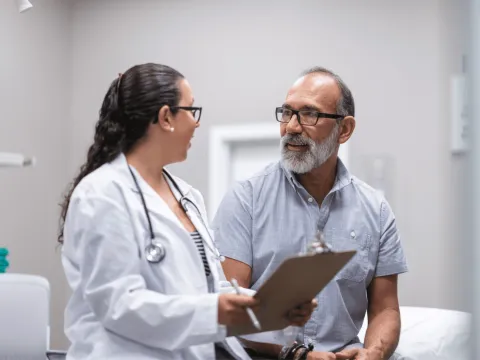- UChicago Medicine AdventHealth

Choose the health content that’s right for you, and get it delivered right in your inbox.
There was a time when women were recommended to examine their own breasts using a step-by-step technique to search for suspicious lumps. Though it seemed to make sense that this technique would catch cancer early, the best medical evidence says otherwise.
That’s why organizations like the American Cancer Society no longer recommend breast self-exams if you’re already receiving mammograms. Part of the reason for that change is that breast self-exams can lead to false alarms and unnecessary medical care.
That doesn’t mean you should ignore your breasts, though. Instead, doctors suggest paying attention to what your breasts look and feel like and contacting your health care provider if you notice any changes.
It’s important to get familiar with what’s normal for you. Even with advanced screening tools available, such as mammography, some breast cancers are still found through physical exams.
What to Watch For
If you’ve got a sense for what’s normal for you, be ready to spot any changes. Talk to your doctor if you notice any of the following:
- The skin of your breast dimples, puckers, or bulges.
- Swelling, redness, or a rash on your nipple or breast.
- A change in the size or shape of your breast.
- Changes with your nipple, such as pushing inward instead of sticking out.
- Fluid coming out of one or both of your nipples that’s watery, milky, yellowish, or bloody.
- A lump or hard knot inside your breast or armpit.
- An area that feels thick inside your breast or armpit.
- Pain in one spot of your breast that doesn’t go away.
- Any change that occurs on one breast that feels different from your other breast.
The Next Step
If you notice a lump or change, don’t panic. These signs usually don't mean that you have breast cancer. There are common noncancerous breast conditions that can cause symptoms, too. The only way to find out for sure is by making an appointment with your doctor to get checked.
Just as a multivitamin can’t replace a healthy diet, self awareness can’t replace mammograms. Depending on your health history and risk factors, we recommend women start getting mammograms between the ages of 40 and 50.
UChicago Medicine AdventHealth knows breast health is about more than your body. It’s about peace of mind. That’s why we offer the latest technology — including digital mammography, MRI and ultrasound — that gives you the best chance at spotting cancer early.
If you’re due for a mammogram, schedule one at Bolingbrook, GlenOaks, Hinsdale, or La Grange hospital by calling 800-595-5602.

